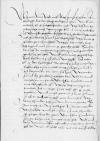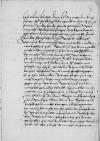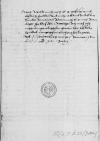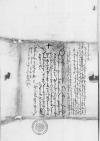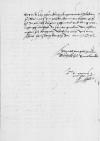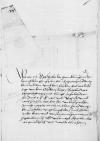Noch dem wir negst von Seeburg (Zybork), town in Ermland (Warmia), 29 km NE of Allenstein (Olsztyn), today Jeziorany⌊SeburgSeeburg (Zybork), town in Ermland (Warmia), 29 km NE of Allenstein (Olsztyn), today Jeziorany⌋ cf. Ioannes DANTISCUS to Albrecht I von Hohenzollern-Ansbach Seeburg (Jeziorany), 1540-01-13, CIDTC IDL 6201⌊geshribencf. Ioannes DANTISCUS to Albrecht I von Hohenzollern-Ansbach Seeburg (Jeziorany), 1540-01-13, CIDTC IDL 6201⌋ / und widerumb her gelangt, / ist unser bot von Cracow (Kraków, Cracovia), city in southern Poland, Małopolska, on the Vistula river, from 1038 capital of the Kingdom of Poland⌊KrakoCracow (Kraków, Cracovia), city in southern Poland, Małopolska, on the Vistula river, from 1038 capital of the Kingdom of Poland⌋ an uns komenn, / unnd so lange under wegen grosser wesserungen halben verzogen, / was uns Sigismund I Jagiellon (Zygmunt I) (*1467 – †1548), King of Poland and Grand Duke of Lithuania (1506-1548); Duke of Głogów (Glogau) (1499-1506), Duke of Opava (1501-1506), Governor of Silesia (1504-1506); son of King Kazimierz IV Jagiellon and Elisabeth of Austria⌊ko(niglich)e m(aieste)tSigismund I Jagiellon (Zygmunt I) (*1467 – †1548), King of Poland and Grand Duke of Lithuania (1506-1548); Duke of Głogów (Glogau) (1499-1506), Duke of Opava (1501-1506), Governor of Silesia (1504-1506); son of King Kazimierz IV Jagiellon and Elisabeth of Austria⌋, unnser allergenedigister herr, in der denneschenn unnd unnser Provincial Diet of Royal Prussia ⌊tagfartProvincial Diet of Royal Prussia ⌋ disses orts hanndlung zu antwurt geben, / wirt E(wer) F(urstliche) D(urchlauch)t aus koniglichs cf. Sigismund I Jagiellon to Ioannes DANTISCUS Cracow, 1540-01-04, CIDTC IDL 2266⌊briffscf. Sigismund I Jagiellon to Ioannes DANTISCUS Cracow, 1540-01-04, CIDTC IDL 2266⌋ copey an uns zw vornemenn haben. / Newes ist uns nicht anders geshriben, / dann das Sigismund I Jagiellon (Zygmunt I) (*1467 – †1548), King of Poland and Grand Duke of Lithuania (1506-1548); Duke of Głogów (Glogau) (1499-1506), Duke of Opava (1501-1506), Governor of Silesia (1504-1506); son of King Kazimierz IV Jagiellon and Elisabeth of Austria⌊ko(niglich)e m(aieste)tSigismund I Jagiellon (Zygmunt I) (*1467 – †1548), King of Poland and Grand Duke of Lithuania (1506-1548); Duke of Głogów (Glogau) (1499-1506), Duke of Opava (1501-1506), Governor of Silesia (1504-1506); son of King Kazimierz IV Jagiellon and Elisabeth of Austria⌋ in irer alten kranckheÿt morbo articulari an den fussen gros wethun hab erlittenn und seÿ ( Got hab lob ehr unnd danck ) widerumb mit ir m(aieste)t besser wordenn etc. / Die botschaffter in die Ottoman Empire (Turkey, Turcia)⌊TurckeyOttoman Empire (Turkey, Turcia)⌋, / Hungary (Kingdom of Hungary)⌊HungernHungary (Kingdom of Hungary)⌋, / an Ferdinand I of Habsburg (*1503 – †1564), from 1521 Archduke of Austria, from 1526 King of Bohemia and Hungary, Croatia and Slavonia as Ferdinand I, 1531-1558 King of the Romans, 1558-1564 Holy Roman Emperor; son of Philip I the Handsome and Joanna the Mad of Castile, a younger brother of Charles V of Habsburg⌊ro(misch)e ko(niglich)e m(aieste)tFerdinand I of Habsburg (*1503 – †1564), from 1521 Archduke of Austria, from 1526 King of Bohemia and Hungary, Croatia and Slavonia as Ferdinand I, 1531-1558 King of the Romans, 1558-1564 Holy Roman Emperor; son of Philip I the Handsome and Joanna the Mad of Castile, a younger brother of Charles V of Habsburg⌋ unnd gen Rome (Roma), city in central Italy, on the Tiber river, seat of the Holy See⌊RomRome (Roma), city in central Italy, on the Tiber river, seat of the Holy See⌋ sein uffem wege. / Got gebe, sye was guts und nutzlichs gemeiner christenheit ausrichten. / Tatersche botshaffter sein noch beÿ hove. / Furdren ire goben / oder, wie es recht genent soll werdenn, / gewonlich tribut. / So in das versagt wirt, / sagen sye auch alle freuntschafft uff etc. Unns schreibt E(wer) F(urstliche) D(urchlauch)t gethrewer diner, / der edel, ernfest, unnser freuntlicher etwan hoffbruder Nikolaus Nibschitz (Mikołaj Nipszyc) (*ca. 1483 – †1541), royal courtier, diplomat in the service of Sigismund I and Albrecht von Hohenzollern-Ansbach, Dantiscus' friend; from 1525 until his death an official representative of Duke Albrecht at the Cracow royal court; from 1532 royal secretary; 1519 royal envoy to Albrecht von Hohenzollern, Grand Master of the Teutonic Order, 1525, 1526 envoy to Hungary, 1527 envoy to the Congress in Wrocław, 1531-1533, 1537 envoy to Ferdinand I of Habsburg, 1535-1537, 1540 envoy to Brandenburg, 1536 envoy to the estates of Livonia⌊NibschiczNikolaus Nibschitz (Mikołaj Nipszyc) (*ca. 1483 – †1541), royal courtier, diplomat in the service of Sigismund I and Albrecht von Hohenzollern-Ansbach, Dantiscus' friend; from 1525 until his death an official representative of Duke Albrecht at the Cracow royal court; from 1532 royal secretary; 1519 royal envoy to Albrecht von Hohenzollern, Grand Master of the Teutonic Order, 1525, 1526 envoy to Hungary, 1527 envoy to the Congress in Wrocław, 1531-1533, 1537 envoy to Ferdinand I of Habsburg, 1535-1537, 1540 envoy to Brandenburg, 1536 envoy to the estates of Livonia⌋, / das gewiss die rede ist, / wie der her(r) Hieronim Łaski (Jarosław Łaski, Hieronymus de Lasco) (*1496 – †1541), diplomat in the service of Sigismund I Jagiellon and John I Zápolya, representing them in diplomatic contacts with Ferdinand I of Habsburg and Sultan Suleiman I; 1520-1522 Crown Carver, 1522-1523 Voivode of Inowrocław, 1523-1541 Voivode of Sieradz, from 1528 Zupan of the Spiš district; from 1530 Voivode of Transylvania (PSB 18, p. 225-229)⌊Ieronimi LaskiHieronim Łaski (Jarosław Łaski, Hieronymus de Lasco) (*1496 – †1541), diplomat in the service of Sigismund I Jagiellon and John I Zápolya, representing them in diplomatic contacts with Ferdinand I of Habsburg and Sultan Suleiman I; 1520-1522 Crown Carver, 1522-1523 Voivode of Inowrocław, 1523-1541 Voivode of Sieradz, from 1528 Zupan of the Spiš district; from 1530 Voivode of Transylvania (PSB 18, p. 225-229)⌋ in die Ottoman Empire (Turkey, Turcia)⌊TurckeÿOttoman Empire (Turkey, Turcia)⌋ gekomen, /  GStA PK, HBA, C1 No 625 1v das er do seÿ gefencklich ahngenomen. / Ists dan so, / Got mag im helffen, / denn wir bitten E(wer) F(urstliche) D(urchlauch)t in gluckseligem regiment und lang werriger gesuntheyt in seinen gnaden vor allem argem zw bewaren. /
GStA PK, HBA, C1 No 625 1v das er do seÿ gefencklich ahngenomen. / Ists dan so, / Got mag im helffen, / denn wir bitten E(wer) F(urstliche) D(urchlauch)t in gluckseligem regiment und lang werriger gesuntheyt in seinen gnaden vor allem argem zw bewaren. /
 GStA PK, HBA, C1 No 625 2r
GStA PK, HBA, C1 No 625 2r
Wie wir E(wer) F(urstlichen) D(urchlauch)t geschriben / der hanndlung zwischen dem edlen, ernfesten herr(n) Achatius von Zehmen (Achacy Cema) (*ca. 1485 – †1565), 1517-1531 Chamberlain of Pomerania, 1531-1546 Castellan of Gdańsk (Danzig), 1545-1546 Voivode of Kulm (Chełmno), 1546-1565 Voivode of Marienburg (Malbork) (SBPN 1, p. 194-195; ORACKI 1984, p. 38-39; Urzędnicy 5/2, p. 198; PSB 4, p. 325-326)⌊Achacio CzemeAchatius von Zehmen (Achacy Cema) (*ca. 1485 – †1565), 1517-1531 Chamberlain of Pomerania, 1531-1546 Castellan of Gdańsk (Danzig), 1545-1546 Voivode of Kulm (Chełmno), 1546-1565 Voivode of Marienburg (Malbork) (SBPN 1, p. 194-195; ORACKI 1984, p. 38-39; Urzędnicy 5/2, p. 198; PSB 4, p. 325-326)⌋, dantzker castellan, unnd dem Stanisław Kostka (*1487 – †1555), as a leader of the so-called nobles' party active in Royal Prussia since 1536, Kostka stood in opposition to most of the members of the Council of Royal Prussia, who wanted to maintain the autonomy of the province and a "balance of power" in terms of governance. The tension between the Prussian Subtreasurer and the Council had been increasing since the Diet in Graudenz (Grudziądz) in 1533. Kostka, connected with the royal court since his youth, was sent to Graudenz as the King's deputy and, contrary to custom, decided to take part in the proceedings. In response to such a step, the Council members stopped the meeting. Kostka accused them of hostility towards the Poles and intervened on this matter at the court. In the absence of the then Bishop of Ermland (Mauritius Ferber) it was Dantiscus who chaired the Graudenz Diet. The incident badly harmed his future relationships with Kostka; 1531-1555 Treasurer of the Prussian lands and Treasurer of Marienburg (Malbork); 1544-1545 Castellan of Elbing (Elbląg), 1545-1546 Castellan of Kulm (Chełmno); 1546-1549 Vice-Voivode of Kulm; 1546-1551 Voivode of Pomerania; 1551-1555 Voivode of Kulm (PSB 14, p. 356; Urzędnicy 5/2, p. 216; MAŁŁEK 1976, p. 119-123)⌊CostkenStanisław Kostka (*1487 – †1555), as a leader of the so-called nobles' party active in Royal Prussia since 1536, Kostka stood in opposition to most of the members of the Council of Royal Prussia, who wanted to maintain the autonomy of the province and a "balance of power" in terms of governance. The tension between the Prussian Subtreasurer and the Council had been increasing since the Diet in Graudenz (Grudziądz) in 1533. Kostka, connected with the royal court since his youth, was sent to Graudenz as the King's deputy and, contrary to custom, decided to take part in the proceedings. In response to such a step, the Council members stopped the meeting. Kostka accused them of hostility towards the Poles and intervened on this matter at the court. In the absence of the then Bishop of Ermland (Mauritius Ferber) it was Dantiscus who chaired the Graudenz Diet. The incident badly harmed his future relationships with Kostka; 1531-1555 Treasurer of the Prussian lands and Treasurer of Marienburg (Malbork); 1544-1545 Castellan of Elbing (Elbląg), 1545-1546 Castellan of Kulm (Chełmno); 1546-1549 Vice-Voivode of Kulm; 1546-1551 Voivode of Pomerania; 1551-1555 Voivode of Kulm (PSB 14, p. 356; Urzędnicy 5/2, p. 216; MAŁŁEK 1976, p. 119-123)⌋, / hab wir disse tage von dem Costken solchs cf. Stanisław KOSTKA to Ioannes DANTISCUS Marienburg (Malbork), 1540-01-13, CIDTC IDL 5435⌊schreÿbencf. Stanisław KOSTKA to Ioannes DANTISCUS Marienburg (Malbork), 1540-01-13, CIDTC IDL 5435⌋, / wie beÿgelegte copeÿ mit bringt, / erhalten. / Was hir inne E(wer) F(urstlichen) D(urchlauch)t wil und roth ist / unnd was zuthun wer, / das der unlust zwischen in nicht weyter ein riss / und dem herrn Achatius von Zehmen (Achacy Cema) (*ca. 1485 – †1565), 1517-1531 Chamberlain of Pomerania, 1531-1546 Castellan of Gdańsk (Danzig), 1545-1546 Voivode of Kulm (Chełmno), 1546-1565 Voivode of Marienburg (Malbork) (SBPN 1, p. 194-195; ORACKI 1984, p. 38-39; Urzędnicy 5/2, p. 198; PSB 4, p. 325-326)⌊dantzker castellanAchatius von Zehmen (Achacy Cema) (*ca. 1485 – †1565), 1517-1531 Chamberlain of Pomerania, 1531-1546 Castellan of Gdańsk (Danzig), 1545-1546 Voivode of Kulm (Chełmno), 1546-1565 Voivode of Marienburg (Malbork) (SBPN 1, p. 194-195; ORACKI 1984, p. 38-39; Urzędnicy 5/2, p. 198; PSB 4, p. 325-326)⌋ ungelimpff oder sunst schaden in der Poland (Kingdom of Poland, Polonia)⌊KronPoland (Kingdom of Poland, Polonia)⌋ / und von seinen misgonneren wurd zugetriben, / auch uff unser negst schreiben, / bitt wir gunstiglich uns wolde berichtenn. /
 GStA PK, HBA, C1 No 625 1v das er do seÿ gefencklich ahngenomen. / Ists dan so, / Got mag im helffen, / denn wir bitten E(wer) F(urstliche) D(urchlauch)t in gluckseligem regiment und lang werriger gesuntheyt in seinen gnaden vor allem argem zw bewaren. /
GStA PK, HBA, C1 No 625 1v das er do seÿ gefencklich ahngenomen. / Ists dan so, / Got mag im helffen, / denn wir bitten E(wer) F(urstliche) D(urchlauch)t in gluckseligem regiment und lang werriger gesuntheyt in seinen gnaden vor allem argem zw bewaren. /
